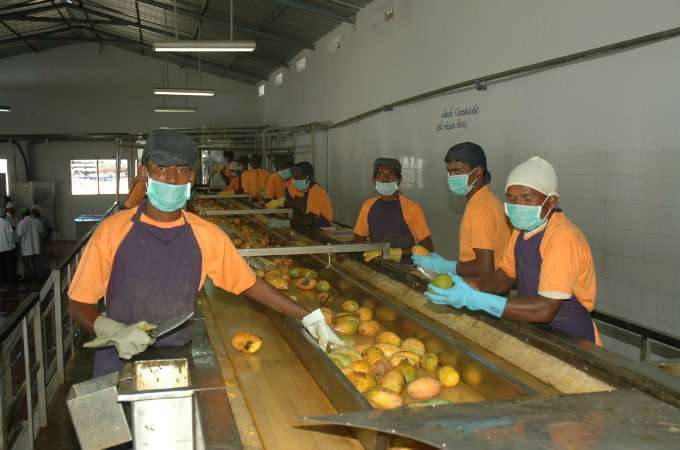
The fruit pulp is the product extracted from the processing of fresh fruits. The aseptic fruit process involves sorting, checking the quality of the fruit, Ripening, washing, destoning, refining, standardization of fruit pulp, check consistency, Brix consistency, and PH level. The aseptic fruit process is done with advanced types of machinery, that makes the process smoothly without any hassles. and Fruit pulps can be stored for a long time and used as an ingredient for producing beverages, fruit drinks and various food processing industries. Demanding customer expectations and a gradual increase in the consumption of organic fruit pulp boost the revenue growth of the fruit pulp manufacturing industry.

Once the product is passed out of the online strainer, it is sterilized. The product is heated at 110 degrees Celcius and then it is cooled down to 2-3 seconds. This tropical fruit pulp process ensures the shelf life of the product is extended. Ascorbic or citric acid is added as preservatives. Most of the tropical fruit pulp process is a hot break. Tropical fruit pulp extraction is mostly done with a hot break. If the acidity of the product is maintained, there is no need for a cold break in the tropical fruit pulp extraction.
We have expertise in fruit pulp manufacturing process and infrastructure, empowering us to process a wide range of fruit pulp products in various packaging products. The manufacturing plant was designed following European standards. The raw materials flow through mechanised conveyors, both for unloading and feeding fruits.
The plant is fitted with a 10-ton mono block steriliser and a double effect evaporator. This evaporator is a specially designed hybrid that creates a concentrate of the highest colour. The output capacity of this evaporator is 7.5 MT per hour of 28 – 30 Brix concentrate. Our fruit pulp processing plant is the most modern and hygienic of all plants in the Indian mango pulp industry.
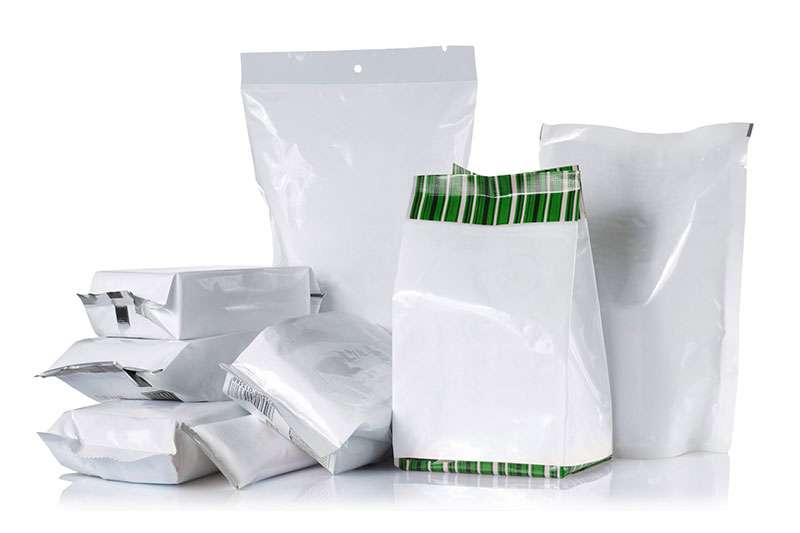
The aseptic fruit process is carried out using imported aseptic fruit equipment. Our adherence to good manufacturing practices is evident in our aseptic fruit processing. Our fruit extraction process is automated and the entire plant is designed, constructed, and equipped as per international standards. Our manufacturing plant is located in the heart of India’s fruit growing belt.
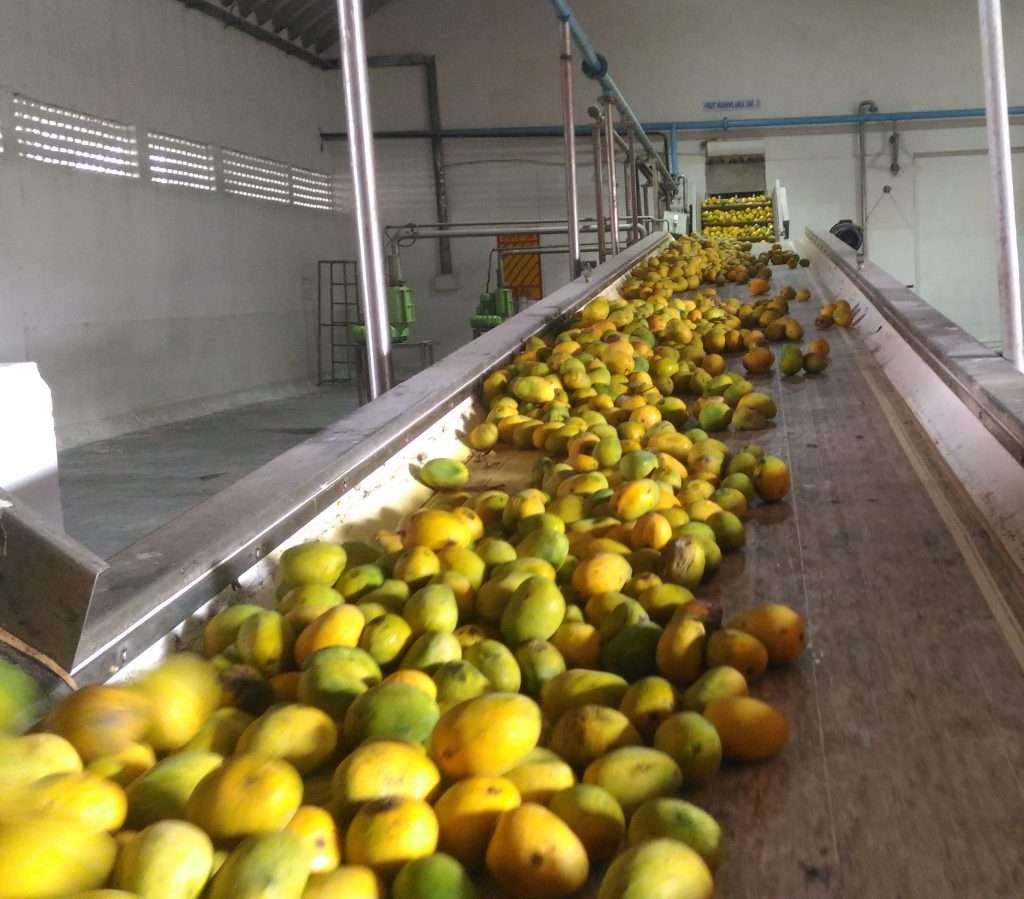
The aseptic mango pulp processing includes the selection of ripe mangoes, washing with disinfectant, tip cutting, final inspection of fruits, destoning, fine pulping, preheating, and decantation or separation. The evaporation process is carried out only for concentrated mango products. Since quality is considered an important factor in the mango pulp industry, our priority is to ensure mango pulp processing meets the expectations of the customers globally. The mango pulp is passed through foreign matter control devices such as magnetic trap, and strainer. The thermal processing is done through PLC based aseptic sterilizer machines and packed in aseptic bags in MS drums. The mango pulp manufacturing process ensures that the aroma of the fruit and natural flavour is retained in the final product.
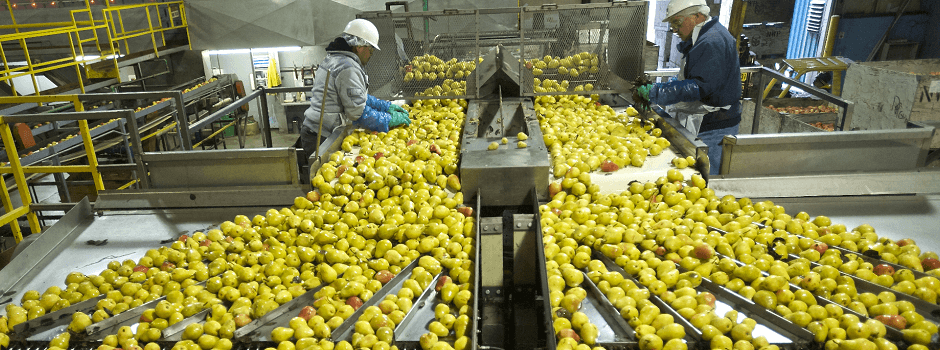
Aseptic Guava Puree and concentrate is processed from a sound mature and selected variety of white and pink guava fruits. Guava pulp processing involves sorting, ripening, Washing with disinfectant, final inspection, fruit milling, Pulping and finishing, and decantation. The evaporation process is done to produce Guava concentrates.
Since there are major concerns in food safety due to the presence of pathogens and microorganisms, the processing of Guava is done with utmost care. Strainers, magnetic traps and metal detectors are used to remove the speck particles that make the product free from harmful substances. The Guava pulp is sterilized by a PLC based aseptic sterilizer machine and packed in aseptic bags in MS drums. The growing demand for the guava pulp requirement in the international and domestic markets adds value to the product and ensures the processing of guava is carried out in healthy and hygienic conditions.
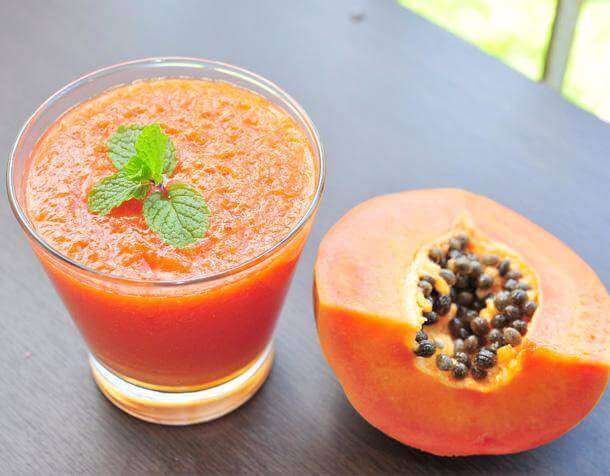
Aseptic Papaya puree is extracted from sound mature and ripened red papaya fruits. Papaya pulp processing involves sorting of red papayas, washing with fresh and chlorinated water, Slicing, final inspection, and Crushing. Papaya pulp processing also involves preheating the pulp at 85-90 deg C to remove pathogenic microorganisms. The preheated pulp is stored in the pulp collection tank and passed through the strainer, a decanter for specks removal, and a magnetic trap and metal detector to eliminate the foreign matter. The evaporator is used to produce Papaya puree concentrates. The evaporator absorbs the water content from the fruit pulp and gives uniform consistency to the concentrate products.
Eventually, the pulp is processed thermally with the help of a sterilizer and packed in pre-sterilized aseptic bags and stored in MS drums with poly liner inside. The drum is inspected before filling the fruit pulp. The drum is packed, labelled, and stored in an ambient temperature warehouse. The pulp is inspected several times during the papaya pulp processing and after packaging to make sure we deliver a quality product and our customers are satisfied with our services.
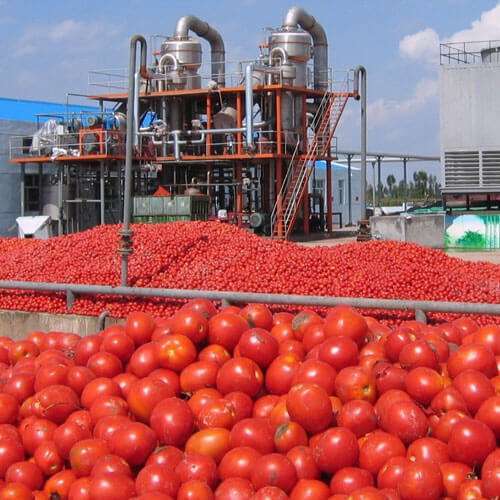
Aseptic tomato paste is manufactured from raw, sound mature and high-quality tomatoes. Tomato paste processing steps include unloading, sorting, washing with disinfectant, final inspection, and cutting. The tomato puree is collected in the storage tank after the crushing process and it is preheated at 85- 90 Deg Celsius to remove pathogens. To produce a concentrate product, the tomato puree is passed through the evaporator to remove the water content from the vacuum process to produce tomato paste. We have online magnets and metal detectors to control any metal parts present in the fruit pulp.
To ensure the Tomato paste processing is carried out efficiently, we do online laboratory tests to check whether the product meets the customer requirements. The fruit pulp is tested to check the consistency of the product. The fruit pulp is finally packed in aseptic bags in MS drums. The drums are sealed, labelled and stacked in temperature controlled warehouses.

Pineapple juice processing involves the selection of ripened pineapples, sorting, and washing with fresh and chlorinated water. The Pineapples are de-crowned manually, sliced, inspected and crushed in the fruit miller to produce pineapple puree. The fruit pulp is preheated to remove microorganisms and the product is thermally processed by a sterilizer. The pineapple puree is packed in aseptic packaging and stored in MS drums.
We have a microbiology laboratory in our processing facility that is fully equipped with machinery for analyzing the product to prevent any microbial contamination. All the batch samples are tested in a cold room for future verification. Our strong technical team and experienced professionals make sure Pineapple juice processing is done hygienically to meet customers’ expectations.
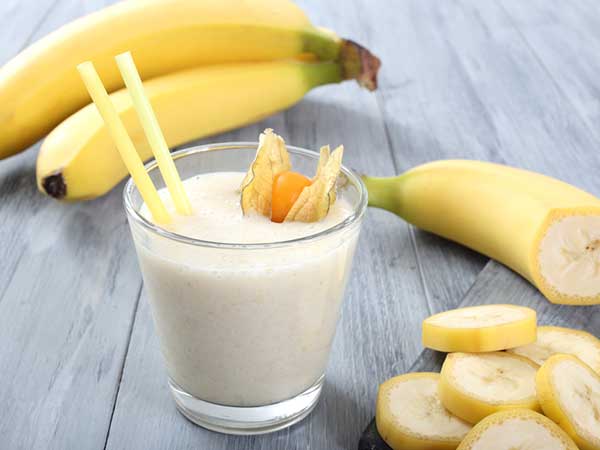
Banana pulp is obtained by commercial processing of sound mature and ripened banana fruits containing their distinctive taste and colour. Banana pulp is manufactured from the cavendish variety. The harvested bananas are brought to our manufacturing facility and they are ripened naturally in the ripening chambers and are sorted to remove the rotten or damaged fruits. The banana pulp processing involves Washing, cutting, mashing, deseeding and thermally processing. The banana pulp is filled in aseptic bags that are manufactured by a hot break method and stored in MS Drums. The banana pulp is stored in a temperature-controlled warehouse and is supplied to various customers across the globe.
Our Customer-centric approach and tropical freshness in our product quality ensure we deliver a high-quality product. Our Banana puree processing line is continuously monitored by our quality team to comply with food quality and international standards.
The aseptic fruit process is carried out with a stringent manufacturing process. Our aseptic fruit processing facility is equipped with advanced machinery for manufacturing, analyzing and packaging.
